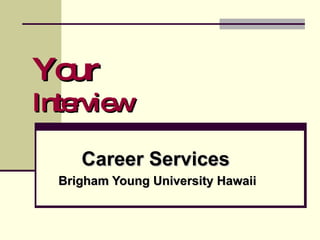BYUH Interview Powerpoint WITHSLIDE DESIGN
•Download as PPT, PDF•
4 likes•1,183 views
BYUH Interview Powerpoint WITHSLIDE DESIGN
Report
Share
Report
Share

Recommended
More Related Content
What's hot
What's hot (19)
Job Searching 101 Sharpening Your Interview Skills

Job Searching 101 Sharpening Your Interview Skills
Viewers also liked
Viewers also liked (13)
Business plan - Entrepreneurship Project - Shivam Jaiswal

Business plan - Entrepreneurship Project - Shivam Jaiswal
Similar to BYUH Interview Powerpoint WITHSLIDE DESIGN
Similar to BYUH Interview Powerpoint WITHSLIDE DESIGN (20)
BYUH Interview Powerpoint WITHSLIDE DESIGN
- 1. Your Interview Career Services Brigham Young University Hawaii